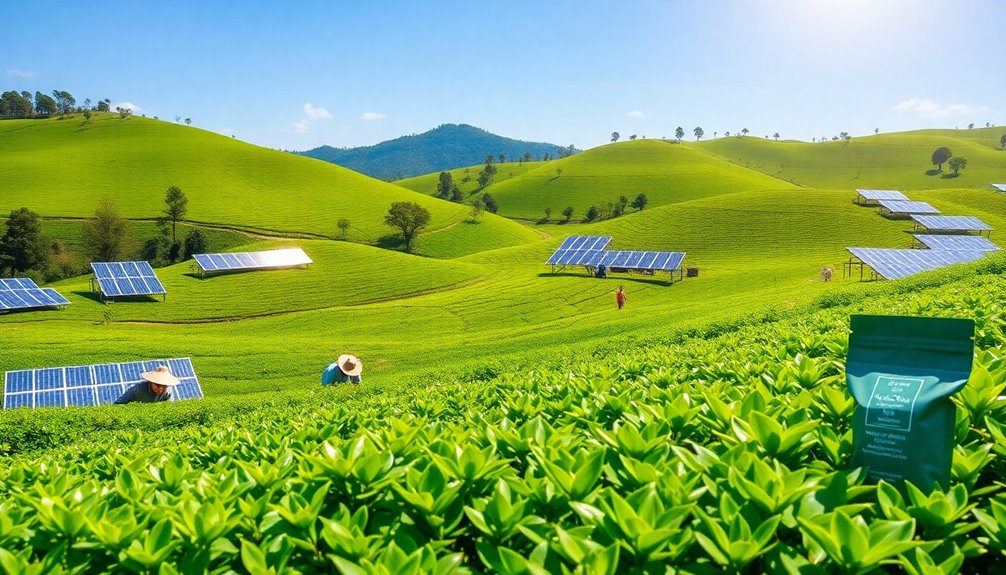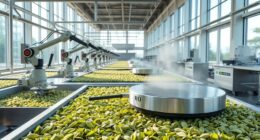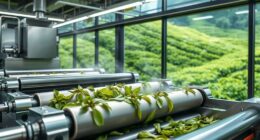Sustainability is reshaping the tea trade in amazing ways! As more folks choose tea, they care about how it's grown and its effects on nature. Many want teas that are certified by groups like Fair Trade, which means they're made with respect for workers and the planet. Sustainable practices boost tea quality too, making flavors more vibrant. Plus, lots of tea drinkers are happy to pay a bit more for responsibly sourced options. This shift is helping workers and the environment thrive. If you're curious about the changes happening in the tea world, stick around to discover more!
Key Takeaways
- Growing consumer demand for sustainable and ethically sourced tea influences production practices and encourages brands to adopt transparency in supply chains.
- Certifications like Fair Trade and Rainforest Alliance are gaining importance, ensuring ethical sourcing and fair labor rights for tea producers.
- Climate change impacts tea-growing regions, prompting a shift towards sustainable farming practices that enhance quality and resilience in tea production.
- Sustainable practices, such as organic cultivation and integrated pest management, improve tea quality while promoting biodiversity and soil health.
- Increased awareness of labor rights issues drives consumers to support brands that prioritize fair treatment and safe working conditions for tea workers.
Introduction

In today's world, the tea industry's evolving landscape reflects consumers' growing concern for sustainability and ethical practices. You mightn't realize it, but your choices can shape how tea is grown and produced. More and more people are looking for sustainable tea options that support fair wages and safe working conditions for tea producers.
These changes are important, especially as climate change threatens key tea-growing regions. As you sip your favorite tea, think about the people behind it. They deserve fair treatment and labor rights. Certifications like Fair Trade and Rainforest Alliance are becoming essential, helping you choose tea that's not only tasty but also ethically sourced.
These certifications ensure that tea producers follow sustainable practices, promoting a healthier environment. Technology is also playing a role in improving transparency in the tea supply chain. This means you can know where your tea comes from and how it's made.
Global Tea Market Dynamics
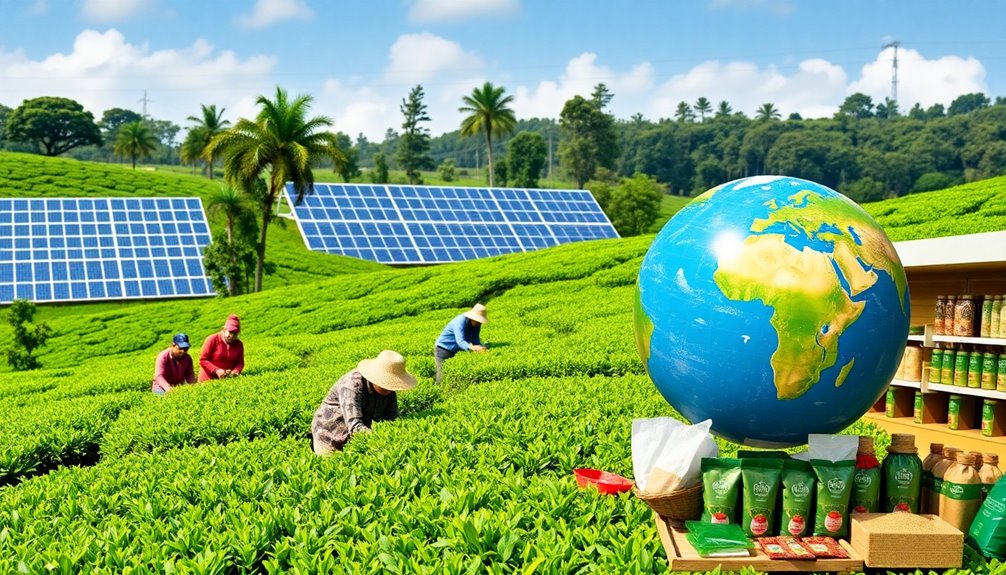
The global tea market is a vibrant tapestry woven from the threads of tradition and modern consumer demands. It's worth about USD 200 billion! This market thrives thanks to top producers like China, India, Kenya, and Sri Lanka, which make up nearly 70% of tea production.
With around 5 billion cups of tea enjoyed daily, you can see why ethical sourcing and sustainable tea are becoming so important. More and more people like you're willing to pay extra for tea that comes from responsible sources. In fact, studies show 66% of consumers prefer sustainable options!
Certification schemes like Fair Trade and Rainforest Alliance are helping, too. Almost 50% of tea produced in India is now certified, making it easier for smallholder farmers to sell their amazing products.
Technology is also playing a big role in this transformation. With tools like blockchain, you can trace your tea from the farm to your cup. This push for transparency and accountability helps reduce the environmental impact of tea production.
Sustainable Practices Enhance Tea Quality
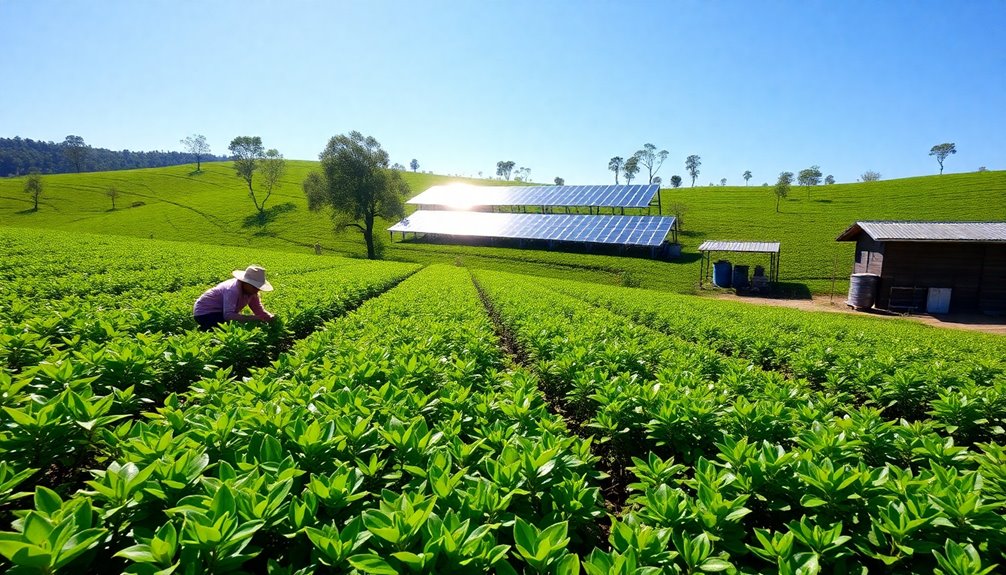
Sustainable farming practices consistently enhance tea quality, making every cup not just a pleasure but also a healthier choice.
When you sip tea grown through organic cultivation, you enjoy flavors enriched by nature's goodness. These methods help keep soil healthy and encourage biodiversity conservation, which means stronger plants that can resist pests and diseases.
By using fewer chemical inputs and focusing on integrated pest management, farmers reduce the risk of harmful pesticide residues in your tea. This means you can feel good about what you're drinking!
Plus, regenerative agriculture techniques can boost tea production, with some farmers seeing a remarkable 30% increase in yields.
As you explore your tea options, you'll notice that consumer preferences are shifting toward sustainably sourced products.
This shift encourages producers to focus on quality while embracing ethical practices. This not only elevates the taste but also makes you a part of a positive change in the tea trade.
Consumer Demand for Ethical Sourcing
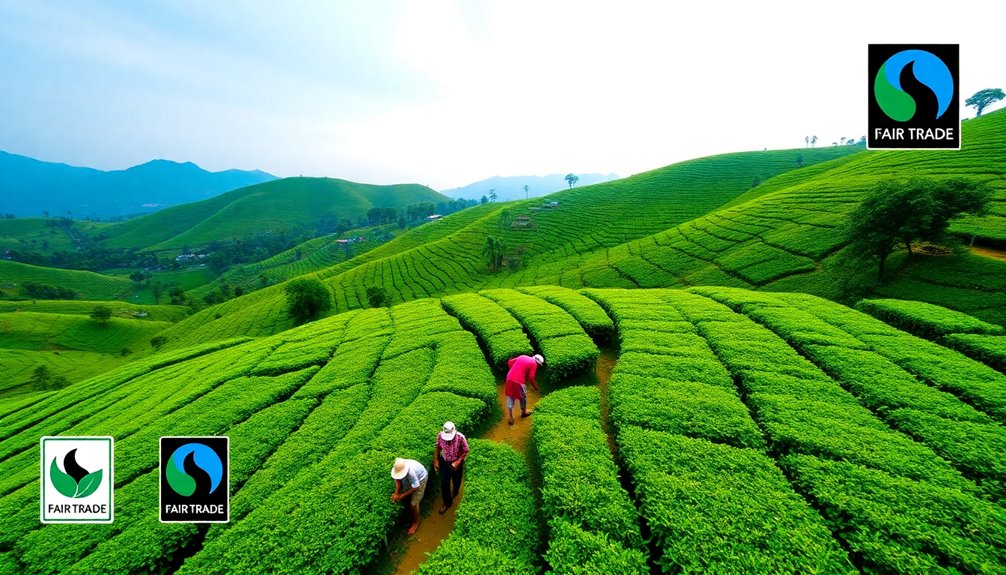
As tea drinkers become more conscious of where their beverages come from, consumer demand for ethical sourcing is skyrocketing. People like you're looking for teas that not only taste great but also support the planet and the communities that produce them. This shift is exciting!
With about 5 billion cups of tea consumed daily, many are willing to pay a little extra for products that meet high sustainability standards. Certification programs like Fair Trade and Rainforest Alliance help by ensuring responsible sourcing and fair labor practices. You can feel good knowing that your choice makes a positive impact.
Transparency in tea supply chains is now essential. More consumers want to know the story behind their tea. They want to understand how it's grown and where it comes from.
This demand is driving innovation in the tea industry. Companies are adopting sustainable farming practices and direct trade models, which strengthens consumer trust and loyalty.
Labor Rights Violations in Tea
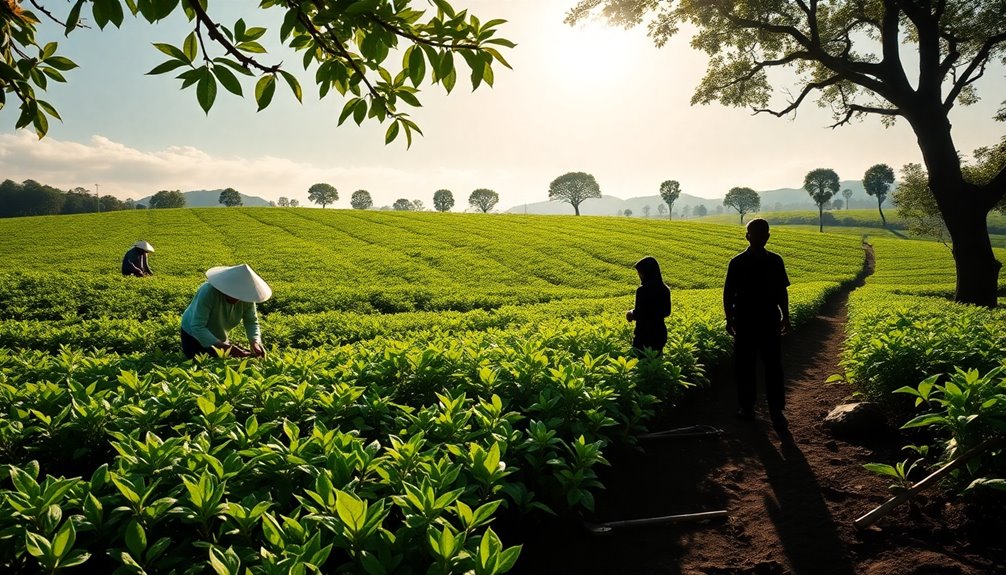
Labor rights violations in the tea industry are a pressing concern that affects countless workers, particularly in regions like India. Many tea workers face low wages, unsafe working conditions, and a lack of healthcare. Women, especially, find themselves in low-paid roles, which makes this issue even more urgent.
In places like Assam and Darjeeling, labor conflicts arise over wage disparities and poor living conditions, showing that better labor standards are needed.
Even though the Plantation Labour Act in India offers health and welfare benefits for workers, it isn't always enforced well. This leads to ongoing problems for tea workers trying to secure decent conditions.
In Sri Lanka, smallholder tea farmers also deal with labor rights issues, especially as climate change and market changes create more challenges.
Certification programs like Fair Trade and Rainforest Alliance are stepping in to help. They aim to improve labor rights by promoting fair pay and safe working conditions.
However, many small producers still struggle to comply. It's vital for all of us to support social responsibility in the tea industry so that tea workers can enjoy better lives and secure their economic viability.
Practical Applications
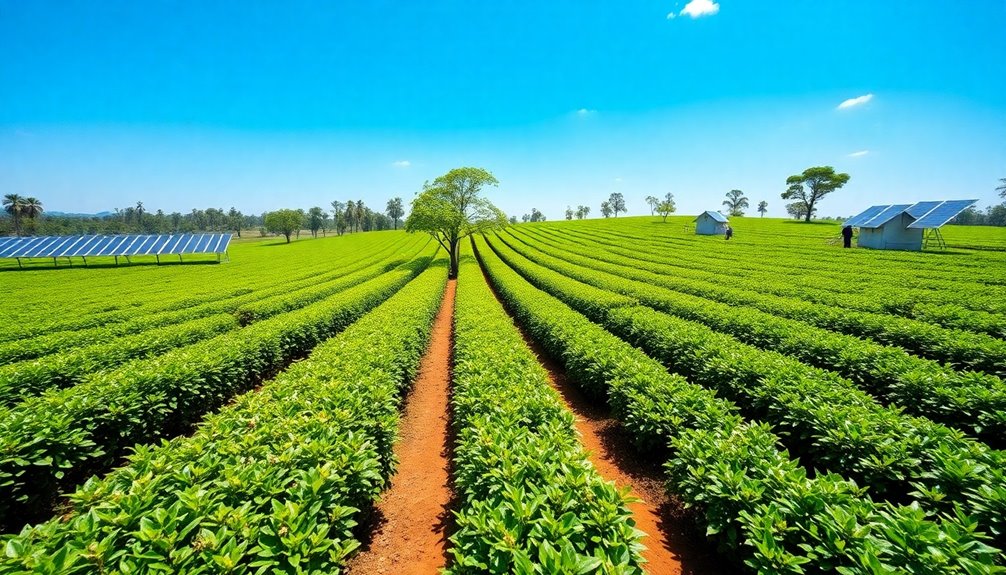
Incorporating practical applications of sustainability in the tea trade can significantly improve both environmental and social outcomes. You can support sustainable farming practices, like agroforestry and organic methods, which help nature thrive while keeping tea production strong.
Certification schemes, such as Fair Trade and Rainforest Alliance, promote ethical sourcing and environmental conservation. Did you know these schemes are widely followed in Kenya's tea industry? They benefit around 5 million workers!
By using technology like blockchain for traceability, you can ensure transparency in the tea supply chain. This means you can verify that your tea is sourced ethically. Supporting direct trade initiatives empowers smallholder farmers, giving them fairer profits and better market access. This encourages them to adopt sustainable practices.
Educational programs and cooperatives are also key! They help farmers learn about sustainable agriculture, leading to better tea quality and higher yields.
This all ties into the growing consumer demand for responsibly sourced tea. By making these choices, you're not just enjoying a wonderful cup of tea; you're also helping the planet and communities thrive! Isn't that exciting?
Frequently Asked Questions
Why Is Sustainable Tea Important?
Sustainable tea's important because it protects livelihoods, promotes ethical practices, and ensures environmental balance. By choosing sustainably sourced tea, you support smallholder farmers, combat deforestation, and contribute to a healthier planet for future generations.
What Are the Environmental Impacts of the Tea Industry?
The tea industry harms the environment through deforestation, habitat loss, and pollution from chemicals. Climate change threatens tea-growing regions, while plastic tea bags contribute to microplastic issues, underscoring the need for more sustainable practices.
How Can We Make Tea More Sustainable?
You can make tea more sustainable by supporting organic farming, embracing agroforestry, promoting Fair Trade practices, utilizing technology for transparency, and empowering smallholder farmers through cooperatives. These actions enhance environmental health and improve social conditions in tea production.
What Are the Problems With the Tea Industry?
You'll find the tea industry grapples with climate change, soil degradation, pesticide reliance, and poor labor conditions. These issues threaten farmers' livelihoods, harm the environment, and perpetuate social inequalities, making sustainable practices increasingly vital.
Conclusion
Sustainability is changing the tea trade for the better! When tea is grown with care for the planet, it tastes amazing and helps workers too. You can feel great sipping your favorite brew, knowing it comes from farms that respect nature and people. As more folks choose ethically sourced tea, the whole industry is getting greener and kinder. So next time you enjoy a cup, remember, you're part of this exciting journey toward a brighter future!

